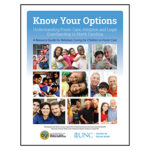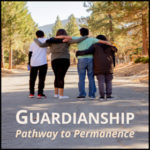What is “permanence” and how is it achieved in the context of North Carolina’s child welfare system?
Legal Permanence
The courts and child welfare system focus a great deal on achieving legal permanence for children and youth in foster care. Legal permanence occurs when the young person has a lasting, legally secure relationship with at least one adult. This adult must have a significant relationship with the young person and agree to protect, provide for, and nurture them into adulthood. Here “legally secure” means the adult has legal responsibility for the child and legal authority to make decisions on their behalf, such as enrolling them in school and consenting for medical care.
The goal is for the child or youth to have a family that will stick with them for the rest of their lives. Everyone needs a home where they know they’ll be safe, loved, and supported for the long haul. Every young person deserves a family where they feel chosen and that they belong.
Children and youth who achieve permanence become more resilient and have better outcomes. The consistent, loving adults in their lives help buffer and minimize the impact of past trauma (Tilbury & Osmond, 2006).
|
Other Kinds of Permanence
In addition to legal permanence, there are two other important kinds of permanence. Relational permanence is an emotional attachment between the youth and caregivers and other family members and kin. Often even when legal permanence isn’t possible, relational permanence is.
North Carolina has made relational permanence one of the primary outcomes focused on by NC LINKS, our state’s independent living program. For each teen in foster care we seek to build a personal support system of at least five caring adults.
There’s also cultural permanence, which is about maintaining a continuous connection to family, tradition, race, ethnicity, culture, language and religion. The importance of maintaining cultural ties is emphasized in resource parent preservice training and is supported by shared parenting and by proactive, respectful communication with children’s families.
Pathways to Permanence
Reunification, adoption, and legal guardianship are the major pathways to permanency in North Carolina.
Reunification is the primary plan for most children and youth in foster care. Reunification occurs when the young person permanently returns to their parents’ home. Before this occurs, parents must demonstrate they can ensure the child’s safety and well-being. When reunification happens, the court returns legal custody of the child to the parents and DSS “closes the case.”
If the child or youth cannot return home, the first choice for a permanent home is with a relative. If the child is already placed with kin, the kinship caregiver will be approached about becoming the child’s permanent caregiver through adoption or legal guardianship.
Adoption. According to North Carolina policy, adoption is the preferred way to achieve permanency when reunification isn’t possible. Adoption establishes a lifelong relationship where the adoptive parent has the same rights and responsibilities as a birth parent. Blood relatives, kin, foster parents, and other individuals with a substantial relationship with the child can be considered for adoption.
Before a child can be adopted, they must be “legally free.” This can happen when both parents voluntarily give up their parental rights or when social services asks the court to terminate parental rights. This is commonly called “TPR.” Termination of a parent’s rights means they permanently lose their right to make decisions for the child as well as their ability to change or regain custody. Once TPR occurs, the parent cannot ask the court to reconsider.
Legal Guardianship is a path to permanence when reunification and adoption are not possible. Guardians have legal authority to provide for and act on behalf of a child. Unlike adoption, guardianship does not require TPR, nor does it give guardians the exact same legal rights and responsibilities as birth parents.
Guardianship is most often appropriate for older youth. It is not recommended for children under age 5 unless the guardian is a relative. Guardianship continues until terminated by a court order, the youth is emancipated, or they reach age 18. Although it legally ends at 18, the hope is that the guardian’s relationship with the child will continue for a lifetime.
What about Custody?
Custody is when a person or entity (such as a county DSS) has legal responsibility for a child and legal authority to make decisions on their behalf. The specific rights and responsibilities of a custodians vary because they are defined by the court. As with guardianship, custody can be awarded to a relative or any person chosen by the court.
Custody is not as legally secure as adoption or guardianship. The court can restore custody to a parent at any time if it decides the parent is capable of caring for the child. Typically, when custody is granted, involvement with child welfare services ends and DSS “closes the case.” Also, custodians are not eligible to receive some of the financial assistance and other supports available to adoptive parents and guardians.
Learn More
To learn more about permanence and the different pathways used to achieve it, please consult the resources below.
 Know Your Options
Know Your Options
This guide outlines the resources, supports, and benefits available to kinship caregivers in North Carolina. Explains the foster care, adoption, and legal guardianship processes and includes a helpful chart that compares different types of kinship placements. Available at https://bit.ly/3dtQPDB.
 Guardianship: Pathway to Permanence
Guardianship: Pathway to Permanence
This free, 1-hour course provides North Carolina resource parents information about guardianship. The course explores differences and similarities between adoption and guardianship and includes interviews in which North Carolina guardians explain why they chose this pathway to permanence and what it has been like for them. Hosted on FosteringNC.org, North Carolina’s learning site for foster and adoptive parents and kinship caregivers. Available at https://fosteringnc.org/on-demand-courses/#guardianship
 Youth Perspectives on Permanence
Youth Perspectives on Permanence
Don’t miss this memorable 2-minute video, in which three young people from North Carolina share their thoughts about what permanence means to them.
Available at https://bit.ly/31V0mOQ


